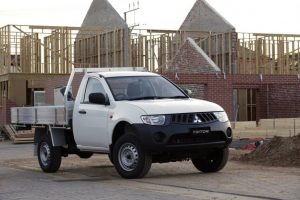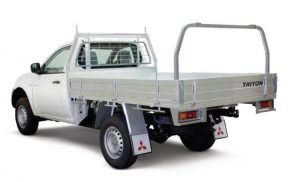Recalls: Mitsubishi MN Triton cab chassis
Overview
Manufacturers, or importers, issue recalls for defects or faults which have the potential to cause injury. Generally, manufacturers will inform the original buyers if their vehicle is subject to a recall and of the steps required to remedy the defect or fault. Please note that the recalls below (if any) are for Australian-delivered vehicles only. Furthermore, the number of recalls should not be taken as an indication of a model’s reliability or its safety more generally.
Recalls: Mitsubishi MN Triton cab chassis
2011-12 model Mitsubishi MN Triton: lower control arm weld failure
In November 2013, a recall was issued for 2011 and 2012 model year Mitsubishi Tritons that were manufactured prior to 11 May 2012. In these vehicles, improper welding on the front suspension lower control arms (LCA) may result in the weld failing. If this occurred, the vehicle would become unstable and pull to either the left or right side of the road (PRA 2013/13839). Prior to inspection, customers should operate the vehicle in a conservative manner to avoid excessive shock load on the parts that may be affected. The affected vehicles were in the following VIN ranges:
- 2WD Tritons: MMAENKA40BD015350 to MMAJYKA40CD012449; and,
- 4WD Tritons: MMACNKB40BD015437 to MMAJYKB40CD013855.
2012 model year Mitsubishi MN Triton: front prop shaft weld failure
In November 2013, a recall was issued for 2012 model year Mitubishi Triton 4WD utilities that were manufactured prior to 25 November 2011. In some of these vehicles, improper welding of the front propeller shafts may result in the weld failing, breakage of the front propeller shaft and damage to the fuel pipe; normal acceleration or deceleration of the vehicle may also be affected. Prior to inspection, customers were advised to operate the vehicle in a conservative manner in 2WD mode where possible. The affected vehicles were in the VIN range MMAENKB40BCD004656 to MMAJYKB40CD005060 (PRA 2013/13844).
Mitsubishi MN Triton: lamp failure
In June 2016, a recall was issued for Mitsubishi MN Triton vehicles because the turn signal and lighting switch connector terminals could become worn during switch operation due to insufficient rigidity – this could result in an accumulation of oxidised dust on the connector terminals. Furthermore, excessive dust accumulation could act as an insulator, affecting terminal conductivity. Continued usage in this conduction could cause conduction failure such that the following may fail to operate or only operate intermittently: the headlamps, turn signal lamps, parking lamp, fog lamps, tail lamp, number plate lamp and cabin lamp. For the VINs of the recalled Mitsubishi MN Triton vehicles, please see PRA 2016/15466.
2010-14 model year Mitsubishi MN Triton: Takata airbag recall
In July 2016, a recall was issued for the 2010 to 2014 ‘model year’ Mitsubishi MN Triton vehicles. In these vehicles, propellant wafers within the driver’s side airbag may absorb moisture over time – this could cause overly aggressive combustion of the airbag on deployment such that the airbag inflator housing could rupture and disperse metal fragments throughout the cabin. These fragments posed a risk of serious of injury. For the VINs of the recalled Mitsubishi MN Triton vehicles, please see PRA 2016/15523.
Search online for recalls by VIN
To see if a Mitsubishi vehicle has been recalled, you can conduct a search on the Mitsubishi Australia website using its VIN.
Problems and faults: Mitsubishi MN Triton cab chassis
Overview
This section identifies potential problems, causes and fixes based on the experiences of owners and repairers, online sources and technical service bulletins. This information is provided solely for reference purposes and AustralianCar.Reviews recommends that only properly qualified persons carry out repairs or modifications. Furthermore, the number of items below should not be taken as an indicator of a model’s reliability or the frequency with which they may occur.
To report a problem or fault to the AustralianCar.Reviews team, please use the Contact Us form. Note that AustralianCar.Reviews does not offer advice on automotive problems or disputes; such enquiries will not receive a reply. For vehicles purchased from dealers after 1 January 2011, please see our Australian Consumer Law fact sheet.
Mitsubishi MN Triton with 2.5-litre 4D56HP diesel engine: overheating
In November 2014, Mitsubishi initiated preventative action service campaign 020116 for Mitsubishi MN Triton vehicles that had 2.5-litre 4D56HP diesel engines and were manufactured prior to 18 March 2014.
According to the service bulletin, the diesel engines of these Mitsubishi MN Triton vehicles could overheat due to excessive loss of coolant caused by ‘repetitive coolant evaporation’ – this could occur after high-load driving such as towing heavy cargo. Furthermore, if head gasket sealing was not adequate at the upper surface of the cylinder block (due to surface roughness), then engine coolant blow-by could occur and contribute to overheating.
As part of the service campaign, the following measures were implemented:
- The radiator cap was to be replaced with a high-valve-opening-pressure type which increased the boiling point. These radiator caps could be identified by their ‘127 kPa’ sticker;
- The coolant was to be replaced with coolant that had a 50 per cent concentration (previously 30 per cent); and,
- The ECU was to be re-programmed for early detection of coolant damage to reduce the risk of engine damage.
These measures, however, did not address the potential inadequacy of the head gasket sealing.
The following measures were implemented in production to reduce the incidence of 4D56HP engine overheating:
- New ECU programming was introduced for earlier detection of coolant loss on 9 September 2013;
- Coolant concentration was increased to 50 per cent on 22 November 2013;
- Radiator valve cap opening pressure was increased to 127 kPa (previously 109 kPa) on 21 February 2014; and,
- The surface of the upper cylinder block was smoother from 18 March 2014, which corresponded to engine no. 4D56 UCFA9504.
Mitsubishi Triton with 4M41 diesel engine: carbon build-up in inlet manifold
For Mitsubishi Tritons with 3.2-litre 4M41 diesel engines, carbon build-up occurs because exhaust gases from the exhaust gas recirculation system (EGR) mixes with oil mist extracted from the crankcase by the positive crankcase ventilation (PCV) system. This causes carbon build-up (a sludge) in the inlet manifold that eventually blocks airflow. As such, it is recommended that the inlet manifold be regularly cleaned to prevent carbon build up.
Mitsubishi Triton with 4M41 diesel engine: Suction Control Valve (SCV) failure
For Mitsubishi Tritons with 3.2-litre 4M41 diesel engines, damage to the Suction Control Valve (SCV) can cause the following symptoms:
- A loss of performance under hard acceleration (particularly between 1800 rpm and 3000 rpm);
- Engine surging during steady acceleration; and,
- Increased fuel consumption.
The Suction Control Valve (SCV) controls the suction volume of the diesel fuel pump, by pulsing the solenoid up to 180 cycles per second. It is understood that the SCV is easily damaged by dirty diesel fuel and there have been reports of the SCV failing around 60,000 kilometres. To fix, the SCV should be replaced.
Mitsubishi ML/MN Triton: clunking noise from steering column
Both the Mitsubishi ML and MN Triton could experience rattling or clunking noises from the steering column. It is understood that the steering column noises occurred because two glued brackets on the steering column – which were designed to ‘collapse’ in the event of a collision – could come loose in the normal operation of the vehicle. Please note, however, that permanently attaching these mountings to the steering column prevents the steering column from collapsing in the event of a front-end collision and increases the risk of injury to the driver. For further information, please see 4x4community.co.za: how to fix the Triton steering column.




